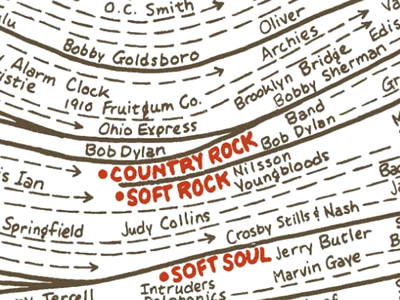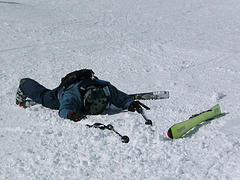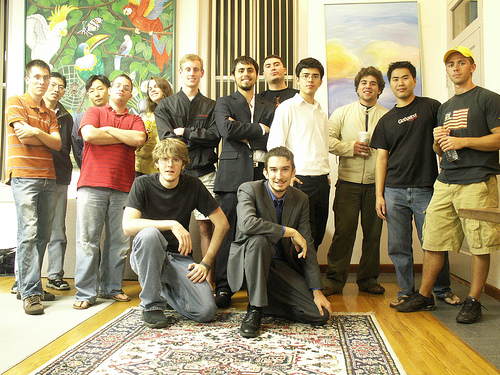Sunday Feb 11, 2007
Saturday Feb 10, 2007
Friday Feb 09, 2007
Tuesday Feb 06, 2007
Steve Jobs wants labels to go DRM free. If they do ... "Apple will embrace this wholeheartedly." (Thanks, Ethan)
DYLAN is a project sponsored by Project Opus Technologies Inc, Simon Fraser University, and the Government of Canada. The participants also acknowledge the important non-financial support of Yahoo! Music, particularly Lucas Gonze and Ian Rogers, without whom this project could not have gotten off the ground.DYLAN is the project name for an open packaging specification for digital music. We think the evidence is clear that the value of an audio file is rapidly fading away. We think that the audio file as only one component of the music experience. We look to develop and establish an open specification that will enhance the value of an audio file by contributing to a shared and personal music experience.
Bob Lefsetz said, "In order for music to sell in vast quantities for a long time, people have to BELIEVE in the act." We hope this specification will play a meaningful role in reconnecting fans with music artists and entertainers.
This is a project to build an OPEN specification for the betterment of the music industry, as such we welcome new partners and contributers to this project.
Monday Feb 05, 2007
 Visual Complexity highlights this classic chart by Reebee
Garofalo that chronicles the growth and dependencies of the world of
rock music from 1958 to 1978. This chart combines about 700 top-50
artists and 30 music styles, showing the length of an artist's
hit-making career as well as the reach for a particular style.
I'd love to see this chart updated to include the last 30 years of
music. Oh ... and make it interactive too, so I can listen
to the Soft Soul of Marvin Gaye and Jerry Butler just by clicking on
their names.
Visual Complexity highlights this classic chart by Reebee
Garofalo that chronicles the growth and dependencies of the world of
rock music from 1958 to 1978. This chart combines about 700 top-50
artists and 30 music styles, showing the length of an artist's
hit-making career as well as the reach for a particular style.
I'd love to see this chart updated to include the last 30 years of
music. Oh ... and make it interactive too, so I can listen
to the Soft Soul of Marvin Gaye and Jerry Butler just by clicking on
their names.
A zoomable version of the chart is online at history shots
Saturday Feb 03, 2007
Wednesday Jan 31, 2007
Grooveshark is a yet to be released online music service focused on sharing and discovering new music. According to their website, Grooveshark will distribute DRM-free MP3s via a p2p network. But unlike the previous generation of P2P music distribution networks, Grooveshark plans to improve the experience by ensuring high quality MP3s, compensating artists, compensating users that share their songs, using SongID to fixup metadata to ensure that you get the right song.
We are starting to see a theme develop in the next generation of web media companies - these companies realize that they can reduce their streaming and music acquisition costs by building on top of P2P networks. The users supply the content and the bandwidth - which greatly reduces the costs to the web startup. The startup can then focus on building a community of listeners and making sure that the proper licensing fees are paid. It's not a bad way to reduce costs, if they can guarantee a good user experience.
Grooveshark isn't open for business yet, but their blog is interesting reading. And it looks like they have a pretty decent size team:
Tuesday Jan 30, 2007
YottaMusic
is a a front-end to the Rhapsody music service. YottaMusic has a
nice cleanly designed web interface that lets you manage, explore and
discover music in the Rhapsody subscription library. I'm not
a Rhapsody user (that silly iPod problem) so I can't compare YottaMusic
to the Rhapsody experience, but my friend Ethan, a regular Rhapsody
user, says it has 'increased his enjoyment of Rhapsody by
271%'. This is an interesting business model - make a new, better
interface to a music service - hopefully YottaMusic makes a bit of money
everytime they send a new subscriber to Rhapsody. Yet another
business model to add to the music ecosystem.
Monday Jan 29, 2007
 Now,
I've always been reluctant to take eMusic up on their free trial
offer because you need to give them a credit card number - but it was
the only way I was going to listen to Deerhoof - so I gave it a shot,
and I'm glad I did. For the price of a CD at the local bookstore, I
can get 50 downloads per month from eMusic. The downloads are
non-DRM'd high-bit rate mp3s (VBR of at least 192K). The
lack of DRM means that I can put the tracks on my iPod (unlike Rhapsody
and Napster). eMusic keeps track of what music I've downloaded so I
can redownload any purchased track so I don't have to worry about
losing my music when my disk dies. The catalog is surprisingly
deep. You won't find U2 or the Beatles, but it is a gold mine for indie
music. It's no surprise that with its deep, long tail
selection of DRM free, high quality music that eMusic is the second
largest digital music store - and I think that eMusic, and offerings
like it will be the future of music. The CD is dead! Long live the
CD.
Now,
I've always been reluctant to take eMusic up on their free trial
offer because you need to give them a credit card number - but it was
the only way I was going to listen to Deerhoof - so I gave it a shot,
and I'm glad I did. For the price of a CD at the local bookstore, I
can get 50 downloads per month from eMusic. The downloads are
non-DRM'd high-bit rate mp3s (VBR of at least 192K). The
lack of DRM means that I can put the tracks on my iPod (unlike Rhapsody
and Napster). eMusic keeps track of what music I've downloaded so I
can redownload any purchased track so I don't have to worry about
losing my music when my disk dies. The catalog is surprisingly
deep. You won't find U2 or the Beatles, but it is a gold mine for indie
music. It's no surprise that with its deep, long tail
selection of DRM free, high quality music that eMusic is the second
largest digital music store - and I think that eMusic, and offerings
like it will be the future of music. The CD is dead! Long live the
CD.Saturday Jan 27, 2007
XSPF - the XML format for playlist sharing is increasingly being adopted by the next generation of online music applications and website. The 'applications' page on the XSPF website lists a good number of applications, websites and libraries that provide support for XSPF. In this mix are some big players such as Last.fm, Webjay, Yahoo Music.
An effective way to share playlists is one of the 'killer apps' of the celestial jukebox - and for that to happen we have to agree on a format for sharing. I think we've reached the tipping point for XSPF - it will be the format of choice for sharing playlists in the celestial jukebox.
Friday Jan 26, 2007
This blog copyright 2010 by plamere



Social Music at TechCrunch
Posted on: Feb 06, 2007
Posted by: plamere
Category: music
Permanent link to this entry | Comments [0] | Comments have been disabled.